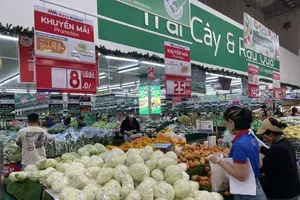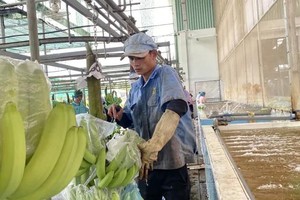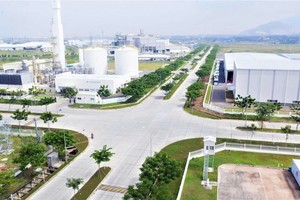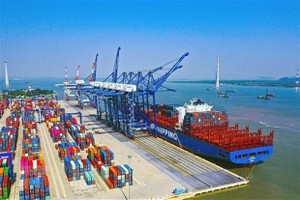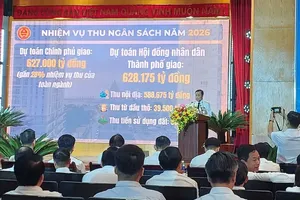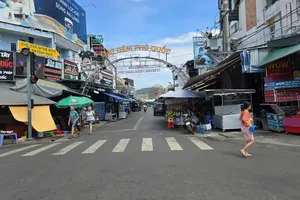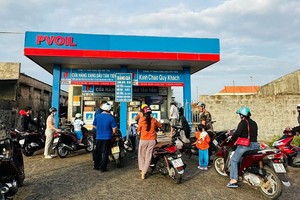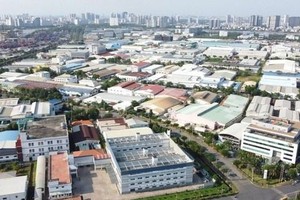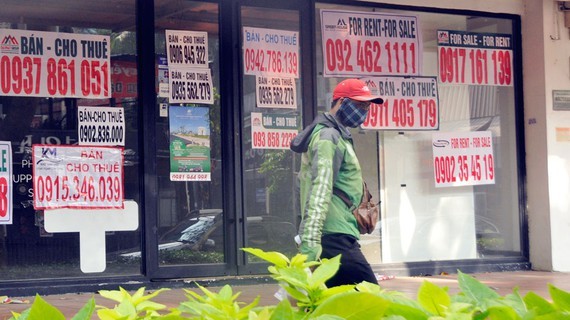
Statistics by the Vietnam Association of Realtors, the number of products trading in the market in the first quarter of this year sharply fell. More than 53,200 products of housing projects were offered across the country but only 7,600 products were sold successfully, accounting for roughly 15 percent. Of which, the number of land and apartments successfully sold had an extremely low rate, just above 2,700 products, accounting for nearly 20 percent of that in the previous year. The segment of luxury apartments saw the highest inventory and almost froze as the cash flow in the market remained weak, apartments priced above VND10 billion could not find buyers.
Noticeably, statistics showed that there were around 1,000 real estate trading floors across the country but by the end of March this year, up to 50 percent of them had shut down. Meanwhile, real estate developers released new products at prices as high as those in the previous year. Although newly-launched projects were unsalable, developers did not lower their prices but offered preferential policies, including discount, gift, and interest rate incentives. However, they failed to attract more buyers. Some projects that were planned to release at the beginning of this year had to temporarily halt because of the impacts of the Covid-19 pandemic.
As for townhouses, many individuals needed money but they also could not sell because no one was interested. If they want to sell, they have to slash their prices sharply. For instance, a house in Bac Hai Housing Estate in District 10 was asked for nearly VND20 billion but it could not be sold for several months. Eventually, it was sold at just above VND15 billion. Most of the real estate prices offered on the Internet are for reference only.
A broker said that she has just successfully sold a house that the owner had asked for nearly VND100 billion but the selling price was just above VND60 billion.
As the market was sluggish, there was no surfing, most successful transactions were mostly because buyers had actual demand for housing. Meanwhile, secondary investors could not withstand the financial pressure. When the pandemic extended, requiring social distancing, several houses for rent and stores had to close down, terminate premises leasing contracts, and transfer premises leasing contracts. Landlords, who borrowed money to buy houses to rent, now have to struggle to pay loan interest. It is the reason why up to 50 percent of petitions for debt rescheduling and repayment postponement related to real estate loans. Those who keep savings dared not to disburse money to buy real estate because they preferred to keep cash during the pandemic, so the real estate market could not see any customer.
However, according to our survey, the prices of real estate were nailed at high levels as developers still offered extremely high prices for their products. Particularly, a small project in An Suong with just a few plots inside a small alley but it was asked for more than VND50 million per square meter, causing other land plots in the residential area which were previously offered at VND20 million per square meter without buyers, to also raise their prices to nearly VND50 million per square meter.
As for the detached house market, investors included loan interest and inflation so they also followed developers to continue to keep the prices at high levels. The price of a land plot with an area of 1,000 square meters of a project in Long Thanh District in Dong Nai Province was just above VND1 billion one year ago, now brokers are asking for a price of more than VND400-VND800 million per meter. Agricultural land was also offered at VND3.5 billion per 1,000 square meters.
A real estate broker admitted that earlier when the real estate market was booming they joined forces to establish real estate brokerage companies. Some of them borrowed money to pump into the land. Now, with loan interest piling up, if they sell their land at low prices they will suffer losses so brokers joined hands to nail the prices.
Moreover, on some real estate brokerage websites, such as batdongsan.com.vn, chotot.com, alonhadat.com.vn, and muaban.net, up to 50 percent of advertisements are false. Not only providing false information on the location, area, and price, but attractive advertisements were also created to get information from customers. Therefore, most people find online real estate advertisements unreliable. If they want to buy houses in any area they will visit that place and contact directly to the owners instead of through brokers. However, many people are displeased as online advertising should bring convenience amid the age of e-commerce but the Ministry of Information and Communications and the Ministry of Industry and Trade did not punish people and websites publishing fake news, cornering the market, and deceiving customers. Many people also suggested taking criminal proceedings against these acts to stabilize the real estate market.
Noticeably, statistics showed that there were around 1,000 real estate trading floors across the country but by the end of March this year, up to 50 percent of them had shut down. Meanwhile, real estate developers released new products at prices as high as those in the previous year. Although newly-launched projects were unsalable, developers did not lower their prices but offered preferential policies, including discount, gift, and interest rate incentives. However, they failed to attract more buyers. Some projects that were planned to release at the beginning of this year had to temporarily halt because of the impacts of the Covid-19 pandemic.
As for townhouses, many individuals needed money but they also could not sell because no one was interested. If they want to sell, they have to slash their prices sharply. For instance, a house in Bac Hai Housing Estate in District 10 was asked for nearly VND20 billion but it could not be sold for several months. Eventually, it was sold at just above VND15 billion. Most of the real estate prices offered on the Internet are for reference only.
A broker said that she has just successfully sold a house that the owner had asked for nearly VND100 billion but the selling price was just above VND60 billion.
As the market was sluggish, there was no surfing, most successful transactions were mostly because buyers had actual demand for housing. Meanwhile, secondary investors could not withstand the financial pressure. When the pandemic extended, requiring social distancing, several houses for rent and stores had to close down, terminate premises leasing contracts, and transfer premises leasing contracts. Landlords, who borrowed money to buy houses to rent, now have to struggle to pay loan interest. It is the reason why up to 50 percent of petitions for debt rescheduling and repayment postponement related to real estate loans. Those who keep savings dared not to disburse money to buy real estate because they preferred to keep cash during the pandemic, so the real estate market could not see any customer.
However, according to our survey, the prices of real estate were nailed at high levels as developers still offered extremely high prices for their products. Particularly, a small project in An Suong with just a few plots inside a small alley but it was asked for more than VND50 million per square meter, causing other land plots in the residential area which were previously offered at VND20 million per square meter without buyers, to also raise their prices to nearly VND50 million per square meter.
As for the detached house market, investors included loan interest and inflation so they also followed developers to continue to keep the prices at high levels. The price of a land plot with an area of 1,000 square meters of a project in Long Thanh District in Dong Nai Province was just above VND1 billion one year ago, now brokers are asking for a price of more than VND400-VND800 million per meter. Agricultural land was also offered at VND3.5 billion per 1,000 square meters.
A real estate broker admitted that earlier when the real estate market was booming they joined forces to establish real estate brokerage companies. Some of them borrowed money to pump into the land. Now, with loan interest piling up, if they sell their land at low prices they will suffer losses so brokers joined hands to nail the prices.
Moreover, on some real estate brokerage websites, such as batdongsan.com.vn, chotot.com, alonhadat.com.vn, and muaban.net, up to 50 percent of advertisements are false. Not only providing false information on the location, area, and price, but attractive advertisements were also created to get information from customers. Therefore, most people find online real estate advertisements unreliable. If they want to buy houses in any area they will visit that place and contact directly to the owners instead of through brokers. However, many people are displeased as online advertising should bring convenience amid the age of e-commerce but the Ministry of Information and Communications and the Ministry of Industry and Trade did not punish people and websites publishing fake news, cornering the market, and deceiving customers. Many people also suggested taking criminal proceedings against these acts to stabilize the real estate market.


